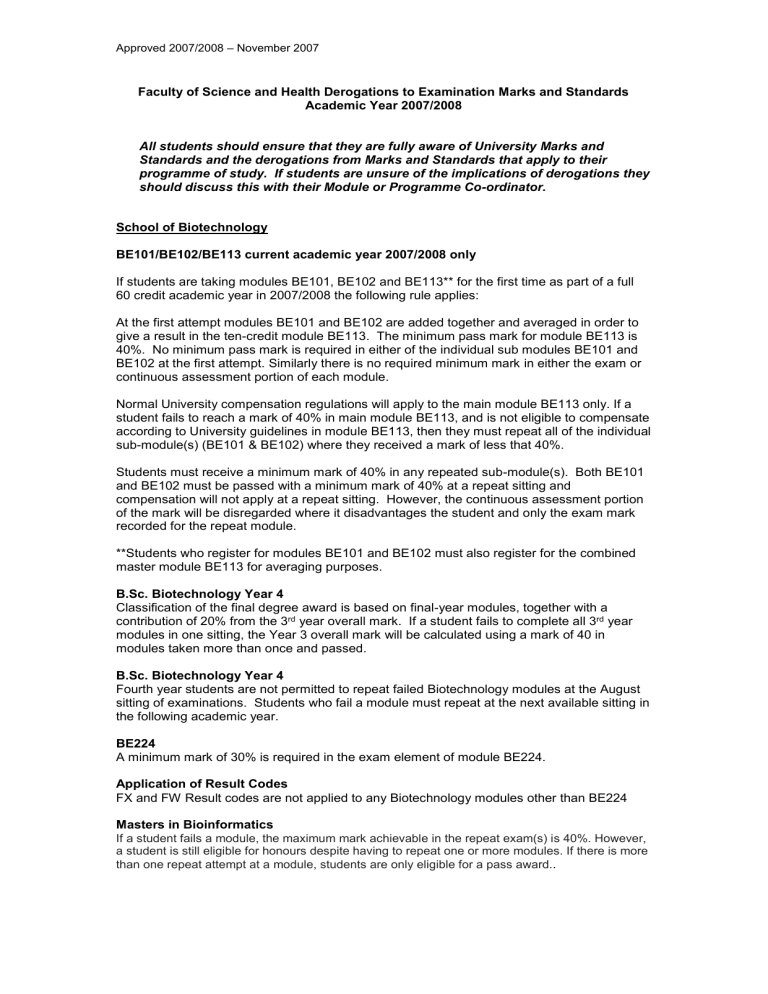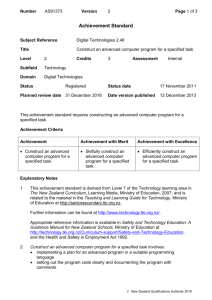School of Biotechnology

Approved 2007/2008
– November 2007
Faculty of Science and Health Derogations to Examination Marks and Standards
Academic Year 2007/2008
All students should ensure that they are fully aware of University Marks and
Standards and the derogations from Marks and Standards that apply to their programme of study. If students are unsure of the implications of derogations they should discuss this with their Module or Programme Co-ordinator.
School of Biotechnology
BE101/BE102/BE113 current academic year 2007/2008 only
If students are taking modules BE101, BE102 and BE113** for the first time as part of a full
60 credit academic year in 2007/2008 the following rule applies:
At the first attempt modules BE101 and BE102 are added together and averaged in order to give a result in the ten-credit module BE113. The minimum pass mark for module BE113 is
40%. No minimum pass mark is required in either of the individual sub modules BE101 and
BE102 at the first attempt. Similarly there is no required minimum mark in either the exam or continuous assessment portion of each module.
Normal University compensation regulations will apply to the main module BE113 only. If a student fails to reach a mark of 40% in main module BE113, and is not eligible to compensate according to University guidelines in module BE113, then they must repeat all of the individual sub-module(s) (BE101 & BE102) where they received a mark of less that 40%.
Students must receive a minimum mark of 40% in any repeated sub-module(s). Both BE101 and BE102 must be passed with a minimum mark of 40% at a repeat sitting and compensation will not apply at a repeat sitting. However, the continuous assessment portion of the mark will be disregarded where it disadvantages the student and only the exam mark recorded for the repeat module.
**Students who register for modules BE101 and BE102 must also register for the combined master module BE113 for averaging purposes.
B.Sc. Biotechnology Year 4
Classification of the final degree award is based on final-year modules, together with a contribution of 20% from the 3 rd year overall mark. If a student fails to complete all 3 rd year modules in one sitting, the Year 3 overall mark will be calculated using a mark of 40 in modules taken more than once and passed.
B.Sc. Biotechnology Year 4
Fourth year students are not permitted to repeat failed Biotechnology modules at the August sitting of examinations. Students who fail a module must repeat at the next available sitting in the following academic year.
BE224
A minimum mark of 30% is required in the exam element of module BE224.
Application of Result Codes
FX and FW Result codes are not applied to any Biotechnology modules other than BE224
Masters in Bioinformatics
If a student fails a module, the maximum mark achievable in the repeat exam(s) is 40%. However, a student is still eligible for honours despite having to repeat one or more modules. If there is more than one repeat attempt at a module, students are only eligible for a pass award.
.
Approved 2007/2008
– November 2007
BE151
BE152
BE205
BE208
BE210
BE225
BE251
BE252
BE255
BE256
BE258
BE258
BE271
BE304
BE306
BE307
BE331
BE351
BE352
BE353
BE371
BE380
BE382
BE383
BE384
BE385
BE409
BE451
BE452
BE480
BE491
BE493
Compensation Regulations
The following modules (inclu ding ‘A’, ‘E’ or ‘M’ versions where appropriate) will not be eligible for compensation . These modules are in addition to those already excluded from compensation in the University marks and standards e.g. modules with a credit value greater than 10.
Practical Biology
Introduction to Experimental Biology
Data Analysis and Statistics
Pollution and the Biosphere
Intro to Biotechnology and Essay
Fluid Flow and Statistics
Biochemistry Laboratory
Microbiology and Microbial Genetics Laboratory
Instrumentation for Biotechnologists
Environmental Biotechnology Labs
Instrumentation, Computing and Introduction to Bioinformatics
Instrumentation, Computing & Intro to Bioinformatics
Biochemical Engineering Laboratory I
Plant Cell Culture
Commercial Biotechnology
Forensic Biology
Science, Ethics and Society
Practical Analytical, Microbiology and Recombinant DNA
Cell Biology and Advanced Biochemistry Lab
Bio-analytical Practical I
Biochemical Engineering Laboratory II
Bioinformatics and Gene Cloning
Methods in Cell Culture
Protein Expression, Purification and Analysis
Immunology Techniques
Analytical Microbiology
Environmental Ethics
Bio-processing Laboratory
Bio-analytical Practical II
Advanced Laboratory Techniques in Molecular Biology
Literature Review and Presentation
Analytical Science Literature Survey
Approved 2007/2008
– November 2007
School of Chemical Sciences
Graduate Diploma / Masters in Instrumental Analysis
Candidates must complete the literature survey in order to obtain the Graduate Diploma. In order to transfer to the M.Sc. programme candidates must pass all Graduate Diploma modules at the first sitting and get an overall average mark of 50% or more.
Graduate Diploma / Masters in Chemical and Pharmaceutical Analysis
Students wishing to progress from the Graduate Diploma in Chemical and Pharmaceutical
Analysis to the Masters in Chemical and Pharmaceutical Analysis must meet the following criteria:
In order to progress students must attain an overall precision mark of 50% or greater in the
Graduate Diploma.
Students who fail more than two modules on the Graduate Diploma will not be eligible to progress to the Masters. These students are eligible to repeat failed modules and complete the Graduate Diploma in Chemical and Pharmaceutical Analysis.
Students who fail two or less modules will have an opportunity to repeat these modules and a maximum mark of 40% will be awarded in the repeat. In order to progress to the Masters students must pass failed modules at the first repeat sitting. Students who do not pass the module at the first repeat sitting will not be eligible to progress to the Masters.
Students will be given the opportunity and time during Semester III and IV to work on their project however they will not formally register for the project until they meet the criteria outlined above and progress to the Masters in June of year 2
Graduate Diploma / Masters in Science Education
In order to transfer to the M.Sc. programme candidates must pass all Graduate Diploma modules at the first sitting and get an overall average mark of 50% or more.
B.Sc. Analytical Science & B.Sc. Chemical & Pharmaceutical Science Year 4 Year Three
Contribution
Classification of the final degree award is based on final-year modules, together with a contribution of 25% from the 3 rd year overall mark. If a student fails to complete all 3 rd year modules in one sitting, the Year 3 overall mark will be calculated using the original (failed) mark in modules taken more than once and passed.
Application of Result Codes
FX and FW Result codes are not currently applied within the School of Chemical Sciences to modules belonging to the School.
B.Sc. Analytical Science, B.Sc. Environmental Science and Health & B.Sc. Chemical &
Pharmaceutical Science Year 4
Fourth year students are not permitted to repeat failed Chemical Science modules at the
August sitting of examinations. Students who fail a module must repeat at the next available sitting in the following academic year.
Compensation Regulations
The following modules (including ‘A’, ‘E’ or ‘M’ versions where appropriate) will not be eligible for compensation . These modules are in addition to those already excluded from compensation in the University marks and standards e.g. modules with a credit value greater than 10.
Approved 2007/2008
– November 2007
CS151
CS251
CS252
CS253
CS254
CS255
CS256
CS257
CS258
CS351
CS352
CS353
CS354
CS355
CS356
CS357
Chemistry Laboratory
Inorganic Chemistry Laboratory
Organic Chemistry Laboratory
Physical Chemistry Laboratory
Inorganic Chemistry Laboratory
Organic Chemistry Laboratory
Physical Chemistry Laboratory
Chemistry Laboratory
Environmental Chemistry Labs
Analysis of Organic and Inorganic Species
Organic Chemistry Laboratory
Physical Chemistry Laboratory
Inorganic Chemistry Laboratory
Chemistry Laboratory
Analytical Laboratory
Pharmaceutical Laboratory
Approved 2007/2008
– November 2007
School of Mathematical Sciences
Masters in Financial and Industrial Maths
Honours classification is based on the weighted calculation of main modules MS570 and
MS571and project only. If a main module is failed (less than 40%), all failed component modules (below 40) must be repeated by repeating the corresponding exam(s) the award is then capped at a pass. No more than three attempts at any exam are allowed.
MS510 Project Module
The project module MS510 cannot be repeated.
If the project moderation meeting agrees a mark of less than 40 in this module for a student, the programme coordinator will inform them of this by email, and give them the opportunity to resubmit the same project; at least four weeks will be given before this resubmission is due.
The programme coordinator will also arrange for the project to be reassessed in time for consideration by the autumn Progressions and Awards Board. The reassessment will include an oral examination.
B.Sc. Mathematical Sciences
The project module MS409 can be repeated only once.
If the summer Progression and Awards Board fails students in this module, the programme coordinator will contact these students by email, giving them the opportunity to resubmit the same project; at least four weeks will be given before this resubmission is due. The programme coordinator will also arrange for the project to be reassessed in time for consideration by the autumn Progressions and Awards Board. The reassessment will include an oral examination. A students who decides not to resubmit the same project in this way, will have to undertake a different project in the next academic year.
Application of Result Codes
Students are not required to repeat failed continuous assessment elements in MS modules once results have been officially recorded. Hence the application of the FW result code is not required.
Final Year Repeat Examinations
Level 4 Mathematics Modules are available in the Autumn Diet of Examinations for repeat if necessary.
Compensation Regulations
The follow ing modules (including ‘A’, ‘E’ or ‘M’ versions where appropriate) will not be eligible for compensation . These modules are in addition to those already excluded from compensation in the University marks and standards e.g. modules with a credit value greater than 10.
MS409 Year Four Project
Approved 2007/2008
– November 2007
School of Physical Sciences
PS122, PS123 & PS113
No minimum pass mark is required in either of the individual sub modules PS122 and PS123.
The result in the ten credit main module PS113** is calculated based on the average of submodules PS122 and PS123. The minimum pass mark for module PS113 is 40%. University compensation regulations apply to the main module PS113 only.
If a student fails to reach a mark of 40% in main module PS113, and is not eligible to compensate according to University guidelines in module PS113, then they must repeat all the failed individual sub-module(s) (PS122 & PS123). A failed sub-module is considered a sub-module with a mark of less than 40%.
Following the repeat sitting of the failed element the average of modules PS122 and PS123 will be recalculated and a repeat mark awarded in the main module PS113.
There is no requirement in the repeat diet to attain a minimum mark in either sub-element
PS122 or PS123. The pass mark for the main module PS1113 at the repeat sitting is 40%.
****Students who register for modules PS122 and PS123 must also register for the combined master module PS113 for averaging purposes.
B.Sc. Applied Physics, B.Sc. Physics with a Language, & B.Sc. Physics with
Astronomy. Year 4
Main Modules PS439, PS440, PS444, PS445, PS447 and PS448 are calculated as an average of the theory sub-modules taken. The minimum pass mark in each main module is
40%. There is no minimum pass mark required in each sub-module. Compensation is permitted on one main module where the mark is no lower than 35% in the main module and the student has achieved a precision mark of 45% or greater.
B.Sc. Applied Physics, B.Sc. Physics with a Language, & B.Sc. Physics with
Astronomy, B.Sc. Physics with Biomedical Sciences. All Years
The final module mark will be computed by combining final examination mark with weighted continuous assessment mark. There is no stipulation that students must attain a minimum mark in either the examination or CA element this applies to all modules taught to the B.Sc.
Applied Physics, B.Sc. Physics with Biomedical Sciences, B.Sc. Physics with a Language, &
B.Sc. Physics with Astronomy.
Result Codes
FX and FW Result codes are not currently applied within the School of Physical Sciences to any module taught to the B.Sc. Applied Physics, B.Sc. Physics with a Language, & B.Sc.
Physics with Astronomy.
B.Sc. Applied Physics, B.Sc. Physics with a Language, & B.Sc. Physics with
Astronomy, B.Sc. Physics with Biomedical Sciences. Year 4
Classification of the final degree award is based on final-year modules, together with a contribution of 20% from the 3 rd year overall mark. If a student fails to complete all 3 rd year modules in one sitting, the Year 3 overall mark will be calculated using a mark of 40 in modules taken more than once and passed.
B.Sc. Applied Physics, B.Sc. Physics with a Language, & B.Sc. Physics with
Astronomy, B.Sc. Physics with Biomedical Sciences. Year 4
Students in AP4, PHA4, PF4 and PG4 and PBM4 may not take examinations in the repeat examination diet in August. Should students in these classes fail, defer or be absent from an examination in either the semester one or semester two diets of examinations, their next opportunity to take this examination will be in the following academic year.
Approved 2007/2008
– November 2007
B.Sc. Science Education Year 4
In relation to individual modules on the SE interdisciplinary programme, it was agreed at the
School Teaching Meeting (21 st November 2007) that specific derogations would be applied on a module level according to the School to which they belong. E.G. Module derogations for the School of Physical Sciences will apply to all PS modules, Module derogations for the
School of Chemical Sciences will apply to all CS modules and so forth.
B.Sc. Science Education Year 4
Year Three Contribution
Classification of the final degree award is based on final-year modules, together with a contribution of 20% from the 3 rd year overall mark. If a student fails to complete all 3 rd year modules in one sitting, the Year 3 overall mark will be calculated using a mark of 40 in modules taken more than once and passed.
Teaching Practice Modules
SE2 TP (ES216) is pass/fail - the pass mark boundary lies at a notional 50%
SE3 TP (ES305) is graded on a scale from 0 to 100, and the pass mark is 50%.
Grad Cert / M.Sc. in Plasma and Vacuum Studies
On the recommendation of the External Examiner it was agreed that students be required to achieve a mark of 40% in both the exam element and in the continual assessment element of modules PS508, PS509, PS510 PS511, PS512, PS513 and PS514. The overall pass mark for each of these modules remains as 50%. The amendment to the required pass mark for the continual assessment element will come into effect from Semester II of the current academic year 2007/2008.
Compensation Regulations
The following modules (including ‘A’, ‘E’ or ‘M’ versions where appropriate) will not be eligible for compensation . These modules are in addition to those already excluded from compensation in the University marks and standards e.g. modules with a credit value greater than 10.
ES216
ES305
Microteaching and Teaching Practice
Teaching Practice & Preparation
PS151
PS153
PS156
PS251
PS251
PS253
PS253
PS254
PS255
Laboratory I
Physics Laboratory for General Science
Physics Laboratory for Science Ed I
Laboratory II General Physics
Laboratory II General Physics
Laboratory Project I
Laboratory Project I
Physics Laboratory
Physics Laboratory II (Science Education)
PS256
PS310
Environmental Physics Labs
Astronomical Techniques
PS351 Physics Laboratory V
PS352 Physics Lab III (Science Education)
PS151 Laboratory I
PS153 Physics Laboratory for General Science
Approved 2007/2008
– November 2007
School of Health and Human Performance
In accordance with University Marks and Standards in an instance where a student is within
0.5% of a borderline grade they will automatically be awarded the higher grade. If a student mark is greater than 0.5% and less than or equal to 1.0% from a borderline grade and the preponderance of the individual module marks fall into the higher grade the candidate will be considered for award of the higher grade.
In addition to this when candidates within the School of Health and Human Performance who have a mark greater than 1% but less than or equal to 2% from a borderline grade, and on combination of year 3 and year 4 results he or she has the equivalent of 60 credits within the higher grade bracket will be eligible for consideration for award of the higher grade. This decision is at the discretion of the Progression Award Board
B.Sc. Sport Science and Health
Classification of the final degree award is based on final-year modules, together with a contribution of 25% from the 3 rd year overall mark.
If a student fails to complete all 3 rd year modules in one sitting, the Year 3 overall mark will be calculated using a mark of 40 in modules taken more than once and passed.
“In exceptional circumstances, the PAB may allow a student who fails a single module to progress to the next level of study (in line with paragraph 57e Marks and Standards).
If this applies to levels two/three then the student who has been admitted to level three is not eligible to apply for the INTRA programme until they have successfully comp leted the module in question”
B.Sc. Athletic Training and Therapy
No compensation will be allowed in either the continual assessment or the end of semester exam for the following modules:
SS218 Injuries 1
SS219 Injuries 2
SS310 Injuries 3
SS313 Injuries 4
SSXX First Aid and Emergency Care
SSXX Case Presentations and Special Populations
Pass marks for each module, both continual assessment and examination, will be 40%
The final degree classification will be based on the following weighting:
Semester 3 and semester 4: 19%
Semester 5 and semester 6
Semester 8:
B.Sc. PE with Biology
54%
27%
Teaching Practice Modules
PEB Teaching Practice (ES216) is pass/fail - the pass mark boundary lies at a notional 50%
Compensation Regulations
The fol lowing modules (including ‘A’, ‘E’ or ‘M’ versions where appropriate) will not be eligible for compensation . These modules are in addition to those already excluded from compensation in the University marks and standards e.g. modules with a credit value greater than 10.
ES216 Microteaching and Teaching Practice
Approved 2007/2008
– November 2007






